Pakistan polls: It's a rich man's world
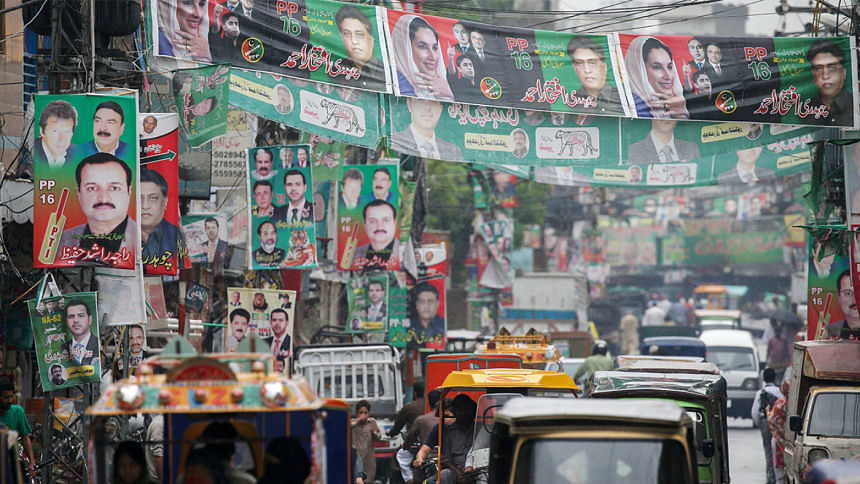
Many people dislike the idea of rich businessmen parachuting into a constituency a month before the election and buying their way into the legislature.
Never mind campaign finance rules that cap spending at Rs 4 million, a candidate running for the National Assembly has to spend up to five times the official limit to ensure that they stand a chance on Election Day. In other words, circumventing the law on maximum spending is at the core of the campaign exercise.
But where does all this money come from: the candidate themselves or their party? Who are the anonymous donors – or ‘personal friends’ – that benevolently let a candidate borrow their fancy Prados and gun-toting guards in speeding double-cabins trailing clouds of dust?
Most of the leading candidates for NA-244 said they had no idea how much they had spent on their election campaign until that point
Speaking to Dawn last week, most of the leading candidates for NA-244 – a Karachi constituency that stretches from Gulistan-e-Jauhar to Defence View – said they had no idea how much they had spent on their election campaign until that point.
“My accountant will have a better idea of the money we’re spending. I’m focused on running the campaign,” said PML-N candidate Miftah Ismail, who served as federal finance minister in the last government.
He’s running his campaign from the head office of Ismail Industries, a confectionery business whose majority shares are controlled by his family members. His average personal income is more than Rs 100 million a year, he says.
The PML-N runs a nationwide campaign on TV and newspapers, but it doesn’t fund campaigns of its individual candidates. They have to arrange their own funds, Mr Ismail says.
“I have never asked my party for funds. It’s also because I’m well-off and can afford to run my own campaign.”
He says a typical campaign in an urban NA constituency should cost anything north of Rs20million.
He didn’t know the exact amount that he is legally allowed to spend on his campaign.
The inability or unwillingness of candidates to come up with an estimate of the actual cost they are incurring is also because a big chunk of it is intangible.
For example, the candidate for the Pakistan Tehreek-i-Insaf (PTI), Ali Zaidi, is running his campaign from the head office of Paragon Constructors, one of the biggest construction firms operating in the country.
Sitting at the corner table in the chairman’s suite of Paragon Constructors, Mr Zaidi explained that setting up the headquarters of his campaign in an already furnished office meant he didn’t have to worry about installing a backup electricity generator or Xerox machine.
But does this not constitute a possible conflict of interest? After all, the company in question is a key stakeholder in numerous projects of Bahria Town, a controversial real estate developer fighting a number of lawsuits for alleged land-grabbing.
The website of Paragon Constructors lists Bahria Apartments, Bahria Town Karachi Bridge, Bahria Town Amusement Park, Bahria Town Ali Villa and Ali Plaza as its executed projects.
Shouldn’t there be proper accounting and disclosure about who is pouring money into a campaign? Mr Zaidi agrees.
“Everything can have a conflict of interest. But I’m not eyeing to be minister for development,” he said in response to a question about the possibility of his benefactor wielding influence if he and his party come to power. “Our whole fight is against this culture of nepotism,” he said while claiming that no businessman would receive any undue favour from his party’s government.
“Businesses operate on contacts worldwide. It’s about who you know and how thick your phone book is. (But) as long as you’re not breaking the law... things move on in life,” he added.
Mr Zaidi is also a businessman like PML-N’s Ismail. But his business is in the United Arab Emirates where he has been running a real estate brokerage and asset management company since 1990.
“If you ask me whether that was the only Rs 8 million (Rs 4 million for the NA seat and Rs 2 million for the two provincial assembly seats) that was going to be spent, then it would not have been enough. I’ll be very honest. So we have friends who donate... let us use their cars. If I start paying (for vehicles and volunteers), I’ll spend the Rs8million within a week,” Mr Zaidi said.
Like the PML-N, the PTI doesn’t provide its candidates with any funds. The campaign bus that he has rented for a month costs Rs 700,000, which includes branding expenses, drivers, petrol and maintenance. Two billboard trucks cost Rs 150,000 each.
“That’s Rs 1 million gone,” he says, noting that he couldn’t afford to deploy more vehicles because he must stick to the spending limit. But the cumulative cost of the whole campaign should be around Rs 20 million, he says.
As for the PPP, its candidate Mian Waqar Akhtar Paganwala says his party hasn’t extended any financial support to him to fight the election.
As per his estimate, he’d spent Rs2.8million until four days before Election Day and his total spending was likely to stay within the prescribed limit.
However, this doesn’t account for the material support he is receiving from his friends in various forms, such as free/subsidised printing of handbills and election merchandise.
Mr Paganwala is a ‘well-established’ businessman by his own account. His net income from a 500-acre fish farm near Thatta alone is about Rs80million per year. He also owns agricultural land of 300 acres besides a mineral water plant, he said.
The Muttahida Qaumi Movement-Pakistan (MQM), which won the majority vote in 2013 from the areas that now constitute NA-244, has fielded Rauf Siddiqui for the 2018 election. He says the MQM doesn’t allow its candidates to spend their own money on campaigns.
“We’re not even allowed to pay the fee for obtaining the nomination form.”
The party collects donations from the general public and spends them through different committees that report directly to headquarters, he says, adding that candidates don’t get access to any party funds.
In the years gone by, this strategy might have worked perfectly well. The party would attract massive funding from private citizens as well as businesses sympathetic to the party’s cause. But its current campaign seems to be in the doldrums at least in NA-244: the MQM has held few large public gatherings and its election camps are few and far between.
“We’ve been living under jabr (oppression) for the last three years. People are scared. But the MQM doesn’t need to spend millions. Our sympathisers may now be volunteering at the election offices of the Jamaat-i-Islami (JI), but they’ll vote for the MQM on July 25,” he claimed.
Mr Siddiqui also said he didn’t know for sure how much a candidate is allowed to spend on his campaign.
The candidate from the Muttahida Majlis-i-Amal (MMA), an electoral alliance of five religious parties, is Zahid Saeed. Belonging to the JI, he’s Managing Director of Indus Pharma, a prominent pharmaceutical company.
Like its archrival MQM, the JI prohibits its electoral candidates from spending their own money. But this doesn’t mean its candidates cannot donate funds if they’re well-heeled. “I donated Rs1.5 million to my party,” he says, claiming that his campaign will adhere to the spending limit.
Outspending rivals becomes necessary for candidates that lack a basic party structure or committed workers at the mohalla level, he says. For example, a candidate in NA-244 will need up to 1,800 polling agents on Election Day. Mr Saeed claims each of his rival candidates is going to pay his polling agents some kind of stipend.
“They’re going to have hired hands on July 25. But we won’t have to spend that much because we already have a strong network of committed workers at the grass-roots level.”

 For all latest news, follow The Daily Star's Google News channel.
For all latest news, follow The Daily Star's Google News channel. 

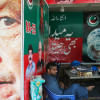
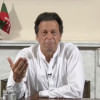

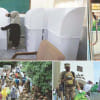
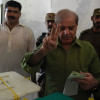


Comments